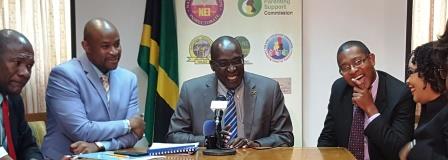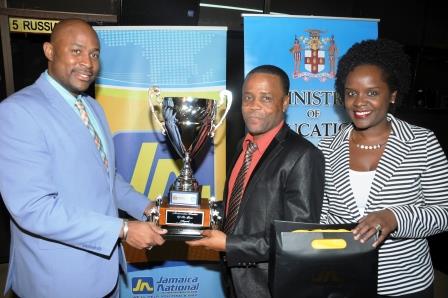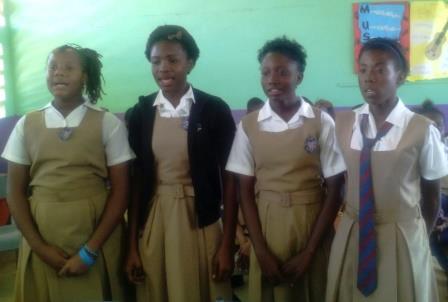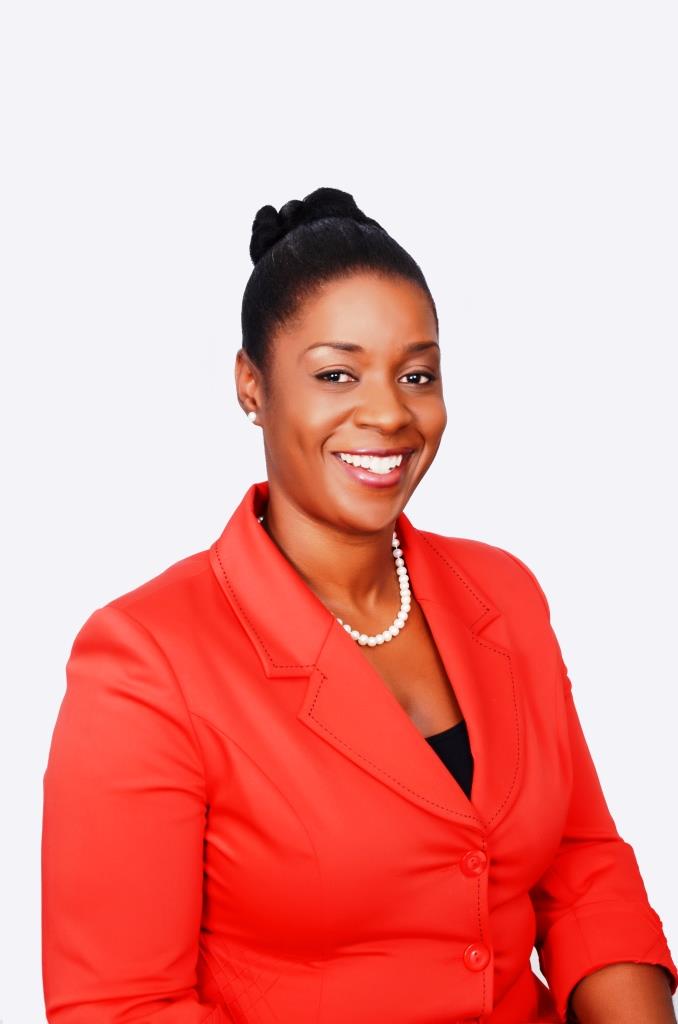Category: Uncategorized
Jamaica Day Edutainment at Belmont Academy
Belmont Academy in Westmoreland transformed its café into a virtual museum of Jamaica’s artistic, culinary, cultural, musical, natural and political heritage in celebrating Jamaica Day on March 4, 2016. Over twelve schools from across the Ministry of Education’s Region 4 (St. James, Hanover, and Westmoreland) shared in this year’s celebrations under the theme, “Celebrating Jamaica, Promoting the Arts.”
Staged by the hosts in collaboration with the Education Ministry and radio station IRIE FM that broadcasted live intermittent interviews from 6:00 am until 3:05 pm, the event unfolded in five parts. First, there was a Jamaican Film prelude that showed excerpts from “Rockers”, “Smile Orange”, “Lime Tree Lane”, Titus in Security”, and “Oliver at Large”. Second, there was an Opening Ceremony that included the invocation by Pastor Mario Parchment of the Water Works District of Seventh Day Adventist churches; welcome and introduction by Principal Rayon Simpson, JP; speeches by Dr. Michele Pinnock Director, Regional Director; Custos Rotulorum of Westmoreland the Very Reverend Canon the Hon. Hartley Perrin, CD, JP; and Keynote Speaker, the motivational Miguel “Steppa” Williams.
Third, there was a concert featuring performances from eight schools with Guest Performer Marsha K, the Digicel 2015 Rising Star First Runner-up. Finally, there was a flag-raising ceremony performed by the St. James High School’s Marine Unit and Marching Band; and five multiple displays by various schools.
“Today was well organized. It had a perfect balance of education and entertainment, reported Head Boy Rajay Dockrey.”
Unity Primary displayed traditional foods (including boiled yam, Mackerel Run-dung, Dhalpurri – an Indian dish – Ackee & Saltfish, Dukunoo – Blue-draws or Tie-leaf-), while Georges Plain Primary showcased Jamaica’s performing arts heritage (musicians, NDTC dancers and the Sound System era), athletics and aspects of slavery.
A composite watermelon sculpture, made possible by parent Sophia Haughton, depicting the Doctor Bird, Bob Marley and Marcus Garvey, was the centre-piece of the Academy’s near exhaustive display that included preserves and pastries produced by their Home Economics Department, students and parents.
The over 1,000 youngsters, parents, teachers, officials and community members in attendance got a glimpse of life in pre-independence Jamaican household implements and cooking utensils including wash pans, chamber pots (chimmie), basins, pails, goblets, tea cups, plates, cooking pots and pans all made from enamel were on display. Also on display were a manual typewriter, an electric floor polisher, several hardboard suitcases (Dulcimena Grips) and clothing of the 1950’s.
“The exhibits show elements of the past that has made us what we are,” commented Keynote Speaker Steppa, as he launched into his highly appreciated half-hour presentation that saw him performing five poems from his wide repertoire including his signature piece, “Talk Up Yout’”. His poems speak to real-life situations from his work as a teacher/motivator in the Correctional Services (prison system); abhors child abuse, and encourages children to take responsibility for their lives and parents to exercise proper parenting.
In addressing the event’s theme, Steppa noted that “one time parents used to discourage children going into music but now music is a career (as is) the creative arts – photography and writing”. “No nastiness, we have enough of that, make sure it’s positive, its clean-up time”, he cautioned to loud applause. The applause went up a notch when he declared that male students must pull up their pants and condemned bleaching of the skin. “Don’t get lost in popular culture that is contrary to your natural culture,” advised Steppa.
Other artistic expressions presented were in the form of dance by Savanna-la-mar Primary and Cave Valley All Age from Hanover; music and dance by St. James High; music, song and dance by Belmont Academy; brass instrumental by Green Pond High; song by Godfrey Stewart High and Haddo Primary and Infant; poetry by Negril All Age and community member Haile Mika’el; while the New Revelation Mento out of neighbouring Beeston Spring entertained intermittently.
Referencing the scripture passage Joshua 4: 5-7, Pastor Parchment stated, “Jamaica has great stories that must not be forgotten. When you leave here today, and when folks ask, tell them the story of excellence so that they may know that Jamaica has good reason to celebrate.”
“I charge you to hold yourself responsible to learn something of our dynamic culture and to pass on the information to others,” Principal Simpson requested of the attentive audience.
In her address, Dr. Pinnock noted that Jamaica Day is a part of the Culture in Education Programme of the Ministry of Education. She quoted Governor General Sir Patrick Allen from his Jamaica Day February 26, 2010 declaration in which he challenged “each Jamaican to gain a deep understanding about being Jamaican”; adding, “Jamaica Day instils the spirit of Nationalism among citizens, it allows us to better understand our heritage as we coach our students into adopting positive values and attitudes.”
“We are here today to raise our heads in the optimism of hope,” encouraged Custos Perrin as he enumerated the achievements made in sports, music and technology. “We celebrate Jamaica because we have ample justification so to do…it is our home.”


In photograph to the left keynote speaker, the motivational Miguel “Steppa” Williams perform to a captive audience. At right Belmont Enterprise student directors from left, President Jasmine McGrowder, Vice President of Production, Barika Clarke and Director of Production Lacyann Campbell man their business.
Welcome Aboard
Senator The Hon Ruel Reid (centre), Minister of Education, Youth and Information along with Mr Floyd Green (3rd right), Minister of State, interacts with senior managers at the ministry’s headquarters at National Heroes Circle during his first day on the job (March 8, 2016). From left are Mr Hector Stephenson, Executive Director, Overseas Examination Commission; Dr Maurice Smith, Permanent Secretary; and Ms Dorrett Campbell, Deputy Chief Education Officer. Dr Smith welcomed the newly appointed ministers who both expressed their desire to lead the ministry’s team in advancing education.
Oneal McLeod Awarded Maths Teacher of the Year
ONEAL MCLEOD, teacher at the Godfrey Stewart High School in Westmoreland, is the Ministry of Education’s Mathematics Teacher of the Year 2016.
McLeod was selected as the winner from five national finalists. Debra Morrison Muir of the Jessie Ripoll Primary school was runner-up, while the other finalists were Marlon McKenzie of the Holy Trinity High School, Karen Hartley of Bethabara Primary and Nerissa Stephens from Little London Primary.
“I feel great. Words cannot explain how I feel today,” said an elated McLeod after receiving the award during a ceremony on Tuesday at the Jamaica Conference Centre, Downtown Kingston.
“I motivate my students and as a teacher I also need motivation. This award certainly serves as motivation for me,” he stated.
McLeod was also named as the finalist for Region Four and copped the award for the best mathematics lesson at the secondary level. Nerissa Stephens from the Little London Primary won for best mathematics lesson at the primary level.
His prizes include a one-year membership to the National Council of Teachers of Mathematics (NCTM), which is the world’s largest organisation concerned with mathematics education, as well as a trip to San Francisco for the NCTM 2016 Conference.
According to Dr Tamika Benjamin, National Mathematics Coordinator at the Ministry of Education, each year the Mathematics Teacher of the Year Competition is a reminder that despite teaching conditions being less than ideal, teachers continue to deliver quality mathematics lessons.
“Teachers are making a commendable attempt to ensure that students are excited by and interested in Mathematics. To this end there has been greater and more strategic use of technology and more deliberate attempts to include learning activities to which students can relate,” Benjamin said.
A total of 107 primary and secondary school teachers from across the six education regions were nominated. Twenty-nine persons were selected as regional semi-finalists; however, only 16 advanced to the regional finals from which five were chosen for the national finals.
Each national finalist was observed teaching a mathematics lesson and was assessed by a panel of elite judges. The candidate’s scores were weighted and totaled to determine the 2016 Mathematics Teacher of the Year.
Dr Renee Rattray, Director of Education Programmes at the JN Foundation, which is a major sponsor for the event, said it was important that mathematics became a critical component in the creative process.
“It is important that mathematics comes alive. The quality of the teacher is one of the most important and significant variables in student performance,” Rattray said.
In the photograph Mr McLeod (centre) celebrates the occasion with Dr Maurice Smith (left), Permanenet Secretary in the Ministry of Education and Dr Renee Rattray, Director of EDucation Programmes at JN Foundation, sponsor of the Mathematics Teacher of the Year Award
Holy Trinity High Students Sing A New Song
Students at Holy Trinity High School in Central Kingston are singing a new song.
“Before students joined the school choir, teachers and parents had complained about their bad behavior,” recounted Andrew Coley, music instructor at the school for 20 years. He reported that since their participation in the choir students’ attire and speech have improved as a result of the discipline that accompanies music education.
Jahnice Solomon invited her school mate Markia Kirkland to join the choir just over one year ago. Both girls are now lead singers in the group that have been invited to perform locally and overseas. “Whenever I sing it makes me feel better. It has opened my mind to see the world in a totally different light. Music has helped to put my mind at ease especially when I am doing my school work,” Solomon said.
Belting out a rendition from reggae legend Bob Marley’s ‘Redemption Song’, their melodious voices filled the small but manageable space currently being used as the music room. Redemption Song was released in 1980 on Bob Marley and the Wailers ‘Uprising’ album. Aspiring to be an internationally acclaimed singer, Kirkland said singing brings her peace. “Whenever I am singing I feel myself in a different world. I feel so relaxed and I am able to enjoy my performance,” she said.
Shekiana Russell loves to sing the Marley rendition as it has kept her motivated. She disclosed that it has been hard on her mother to provide for the family and the song helps to put her mind at a place whereshe will not become enslaved by her circumstances. “Singing makes me happy. I give less trouble and I am able to focus on my school work and what is important,” Russell said.
Coley said he has managed to keep the group motivated by sharing his life experiences with them. “We find the talent and we try to enhance it. I tell them they can go anywhere and perform and use their God given talent to improve their lives,” he recounted.
“They know I am very strict. I sit and talk with them first and I outline my expectations of them. Those that are unable to adhere to the requirements normally leave,” Coley added.
Holy Trinity High School, named after the Holy Trinity Cathedral, was formerly St Anthony’s Senior School. It is a Catholic institution that was established by the Franciscan Sisters at West Street in Kingston in the late- 1940s. The school was later relocated to Orange Street where it operated under the leadership of the Sisters of Mercy responsible for Alpha Academy.
In 1953, the school was relocated to properties owned by the Roman Catholic Archdiocese of Kingston at 18 Emerald Road (now George Headley Drive), the home of the world-famous Sabina Park cricket ground.
In 1995 the school was renamed – Holy Trinity Comprehensive High School – and admitted its first batch of Common Entrance students. In 2000 the school was again renamed Holy Trinity High School in keeping with the Ministry of Education’s policy of upgrading all Comprehensive High Schools.
Photo Caption
Shekiana Russell (left) Jahnice Solomon (2nd left) Brittney Sylvester (right) and Markia Kirkland (2nd right) form the quartet as part of the music group at the Holy Trinity High School. These young ladies belt out the tune from reggae legend Bob Marley’s ‘Redemption Song’
New Ministers’ First Day in Office
Senator the Hon. Ruel Reid (centre), Minister of Education, Information and Youth views a schedule of his activities for the week along with Mr Floyd Green (right), Minister of State and Dr Maurice Smith Permanent Secretary. The Ministers spent their first day (March 8) in office being briefed by divisional and agency heads in the education system.
All in Place for GSAT 2016 Sitting
ALL IS IN PLACE for the 2016 sitting of the Grade Six Achievement Test (GSAT). The tests will take place on Thursday, March 17 and Friday March 18, 2016 in 1090 centres across the island, according to Chief Education Officer Dr Grace McLean.
She has disclosed that the timetables for GSAT 2016 have been dispatched to the Regional Offices and Principals are being asked to contact their respective regions to collect same. Principals are being reminded that to be eligible to sit the GSAT 2016 students must be of the stipulated age and must have mastered the Grade Four Literacy Test.
Queries regarding timetables are to be directed to the Regional Office no later than 4:00 pm on Wednesday, March 9, 2016. Queries should be accompanied by the student’s full name, date of birth, and the school at which the student attained mastery of the Grade 4 Literacy Test, and Exam Registration Number.
School Administrators are also reminded that the directive not to close for the sitting of the Grade 6 Achievement Test 2016 (GSAT, outlined in Bulletin 59/2015), still stands, with closure recommended only if there are severe challenges with space, convenience and suitability of rooms and appropriate seating.
School Administrators are, therefore, being advised to prudently assess the situation in their institution to determine whether closure is inevitable, and advise their supervisory Education Officer of the circumstances influencing this decision. Schools’ staff and parents are encouraged to continue to take an active interest in the students’ preparation for the examination while the Ministry ensures that all systems are in place for a smooth administration.
Tips for Parents
In this regard, schools are reminded to advice parents of students sitting the GSAT that they are to:
1. Remain calm and encourage the child to stay calm.
2. Support, rather than pressure the children/students.
3. Ensure that children/students go to bed early the night before the exam to ensure a good night’s rest.
4. Make plans for children/students to have a nutritious breakfast and a snack during the two days of the examination.
5. Ensure that children/students arrive at the examination centre early.
6. Ensure children/students gather materials needed for the examination from the previous night to avoid searching for things on the morning of the exam. Searching can cause student/child to become flustered.
As customary, in order to ensure quick and easy access to information, telephone hotlines have been set up as follows:
Region 1 – Kingston and St. Andrew 612-5920/612-5918/948-9801
Region 2 – Portland, St. Thomas and St. Mary 993-5586
Region 3 – Trelawny and St. Ann 917-7849
Region 4 – St. James, Hanover and Westmoreland 979-8590
Region 5 – St. Elizabeth and Manchester 625-7859
Region 6 – Clarendon and St. Catherine 745-1153/983-1654-5
Student Assessment Unit 948-9281/922-5680
Chief Education Officer 948-8715
Deputy Chief Education Officer 948-9619
All in Place for GSAT 2016 Sitting
All in Place for GSAT 2016 Sitting
March 7, 2016: ALL IS IN PLACE for the 2016 sitting of the Grade Six Achievement Test (GSAT). The tests will take place on Thursday, March 17 and Friday March 18, 2016 in 1090 centres across the island, according to Chief Education Officer Dr Grace McLean.
She has disclosed that the timetables for GSAT 2016 have been dispatched to the Regional Offices and Principals are being asked to contact their respective regions to collect same. Principals are being reminded that to be eligible to sit the GSAT 2016 students must be of the stipulated age and must have mastered the Grade Four Literacy Test.
Queries regarding timetables are to be directed to the Regional Office no later than 4:00 pm on Wednesday, March 9, 2016. Queries should be accompanied by the student’s full name, date of birth, and the school at which the student attained mastery of the Grade 4 Literacy Test, and Exam Registration Number.
School Administrators are also reminded that the directive not to close for the sitting of the Grade 6 Achievement Test 2016 (GSAT, outlined in Bulletin 59/2015), still stands, with closure recommended only if there are severe challenges with space, convenience and suitability of rooms and appropriate seating.
School Administrators are, therefore, being advised to prudently assess the situation in their institution to determine whether closure is inevitable, and advise their supervisory Education Officer of the circumstances influencing this decision. Schools’ staff and parents are encouraged to continue to take an active interest in the students’ preparation for the examination while the Ministry ensures that all systems are in place for a smooth administration.
Tips for Parents
In this regard, schools are reminded to advice parents of students sitting the GSAT that they are to:
1. Remain calm and encourage the child to stay calm.
2. Support, rather than pressure the children/students.
3. Ensure that children/students go to bed early the night before the exam to ensure a good night’s rest.
4. Make plans for children/students to have a nutritious breakfast and a snack during the two days of the examination.
5. Ensure that children/students arrive at the examination centre early.
6. Ensure children/students gather materials needed for the examination from the previous night to avoid searching for things on the morning of the exam. Searching can cause student/child to become flustered.
As customary, in order to ensure quick and easy access to information, telephone hotlines have been set up as follows:
Region 1 – Kingston and St. Andrew 612-5920/612-5918/948-9801
Region 2 – Portland, St. Thomas and St. Mary 993-5586
Region 3 – Trelawny and St. Ann 917-7849
Region 4 – St. James, Hanover and Westmoreland 979-8590
Region 5 – St. Elizabeth and Manchester 625-7859
Region 6 – Clarendon and St. Catherine 745-1153/983-1654-5
Student Assessment Unit 948-9281/922-5680
Chief Education Officer 948-8715
Deputy Chief Education Officer 948-9619
Thwaites says farewell to staff
Senior managers in the Ministry of Education and support staff of outgoing minister, Ronald Thwaites held a farewell reception for him at the ministry’s head office at National Heroes Circle in Kingston on Friday (March 4, 2016). Members of staff expressed appreciation to Mr Thwaites and advisers Dr Franklin Johnston and Mr Radley Smith for their contribution to the advancement of Education. In his farewell remarks Minister Thwaites committed to continue supporting education from within Parliament. He advised the ministry’s management to welcome and support the new minister as they did for him in 2012. In the photograph from left Mrs Marcia Thwaites joins husband Ronald in accepting a farewell gift from Arlene Williams, Director of Executive Services, while Permanent Secretary Dr Maurice Smith and Chief Education Officer Dr Grace McLean share the moment.
6000 Students to Attend Math Expo
The Ministry of Education will be hosting activities from March 6 to March 10, 2016 to mark the fourth staging of the National Mathematics Week with the objective of improving attitudes to the teaching and learning of Mathematics.
The highlight of the week is the staging of the National Mathematics Expo on Thursday, March 10, 2016 on the grounds of the Old Library at the University of the West Indies Mona beginning at 9:00 a.m. More than 6000 primary and high school students are expected to visit the booths of scores of exhibitors to view the application of mathematical skills in various industries or occupations.
Fifth and sixth form students attending the mathematics expo will have the opportunity to apply for 400 available scholarships to pursue first degree programmes in mathematics and science education. The scholarships will provide full tuition except for miscellaneous costs, support for boarding where needed, and a stipend to help cover the cost of books and other supplies.
“The thrust to provide scholarships for persons choosing to pursue secondary mathematics and science education is to increase the recruitment of fully qualified mathematics and science teachers in the public school system,” explained Dr. Tamika Benjamin, National Mathematics Coordinator.
Other activities for the week include a church service on Sunday, March 6 at the Webster Memorial United Church commencing at 9:45am, a forum and the Mathematics Teacher of the Year Awards Ceremony on Tuesday, March 8. According to Dr Benjamin the week of activities is designed to emphasize the importance of Mathematics and to help students and other stakeholders to appreciate its relevance to everyday life. The theme of the expo is Math Counts.
“We are optimistic that persons will develop a greater appreciation for mathematics and its importance while recognizing that there is enjoyment in learning mathematics,” Dr Benjamin said. “Teachers and principals will also have the opportunity to access resources that are available to support the teaching and learning of mathematics whether through software or other tools that is critical to the teaching and learning process,” she added.
The Ministry’s National Mathematics Programme is aimed at achieving the targets of 85 percent mastery of numeracy by students at grade four by 2018 and 100 percent of the grade-eleven age cohort sitting the Caribbean Secondary Education Certificate examination by 2018.
Sponsors for the week of activities include Jamaica National Building Society, Book Merchant/Scholastic International, First Heritage Cooperative Credit Union, The Gleaner Company and the Insurance Association of Jamaica.








